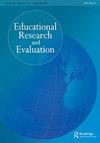Taming randomized controlled trials in education: exploring key claims, issues and debates
IF 3.3
Q1 EDUCATION & EDUCATIONAL RESEARCH
引用次数: 4
Abstract
Keith Morrison’s Taming Randomized Controlled Trials in Education provides a comprehensive theoretical and practical overview of randomised controlled trials (RCTs) as a source of evidence in education. This book is an important and timely contribution to the topic of evidence-based education, offering a provocative and challenging position while paying careful attention to detail and weighting key arguments for and against RCTs in educational research. Making informed and evidence-based decisions is, naturally, central to the methods of scientific investigation, and RCT as the result of an interdisciplinary effort to evaluating interventions includes practices and assumptions from and across various interacting fields. For instance, “evidence-based education” emerges from “evidence-based medicine”, as noted by Coe et al. (2000). Randomised controlled trial research design, in turn, emerged from experimental research in education and psychology (Oakley, 1998), and RCTs in medical and educational research have a range of similarities and differences, as noted by Morrison (p. 103). In the last 2 decades, attention to RCTs in education has surged. This particular research design has been implemented across a broad range of studies, including those concerned with improving learning (Elliott, 2001; C. J. Torgerson & Torgerson, 2001), supporting evidence-based policy in education (Gorard et al., 2017; Katsipataki & Higgins, 2016), and studies focusing on eliminating global poverty (Banerjee et al., 2015; Tollefson, 2015). In recent years, the superiority of RCTs has often been taken for granted and considered to be a methodological “gold standard”. Morrison, however, challenges this habitual assumption in his new book, at least when it comes to considering results from RCTs in an educational context. This book is an important contribution to resources on randomised control trials, such as those authored by D. J. Torgerson and Torgerson (2008) and Glennerster and Takavarasha (2013), which provide introductions to the topic, alongside practical advice on planning, conducting, and evaluating RCTs. Morrison’s newly published book, however, offers a unique critical perspective on RCT research design and its role驯服教育中的随机对照试验:探索关键主张、问题和辩论
Keith Morrison的《驯服教育中的随机对照试验》提供了随机对照试验作为教育证据来源的全面理论和实践概述。这本书对循证教育这一主题做出了重要而及时的贡献,提供了一个具有挑衅性和挑战性的立场,同时在教育研究中仔细关注细节并权衡支持和反对随机对照试验的关键论点。做出知情和循证的决策自然是科学调查方法的核心,而随机对照试验作为评估干预措施的跨学科努力的结果,包括来自各个相互作用领域的实践和假设。例如,Coe等人(2000)指出,“循证教育”源于“循证医学”。随机对照试验研究设计反过来又出现在教育和心理学的实验研究中(Oakley,1998),正如Morrison所指出的,医学和教育研究中的随机对照试验有一系列相似之处和差异之处(第103页)。在过去的20年里,随机对照试验在教育中的关注度激增。这一特定的研究设计已在广泛的研究中实施,包括那些与改善学习有关的研究(Elliott,2001;C.J.Torgerson和Torgerson,2001),支持教育中的循证政策(Gorard等人,2017;Katsipataki和Higgins,2016),以及专注于消除全球贫困的研究(Banerjee等人,2015;Tollefson,2015)。近年来,随机对照试验的优越性往往被认为是理所当然的,并被认为是一种方法上的“黄金标准”。然而,Morrison在他的新书中挑战了这一习惯性假设,至少在教育背景下考虑随机对照试验的结果时是这样。这本书对随机对照试验的资源做出了重要贡献,例如D.J.Torgerson和Torgerson(2008)以及Glennerster和Takavarasha(2013)撰写的随机对照试验,这些随机对照试验介绍了该主题,并提供了关于随机对照试验规划、实施和评估的实用建议。然而,Morrison最新出版的书对随机对照试验的研究设计及其作用提供了独特的批判性视角
本文章由计算机程序翻译,如有差异,请以英文原文为准。
求助全文
约1分钟内获得全文
求助全文
来源期刊

Educational Research and Evaluation
EDUCATION & EDUCATIONAL RESEARCH-
CiteScore
3.00
自引率
0.00%
发文量
25
期刊介绍:
International, comparative and multidisciplinary in scope, Educational Research and Evaluation (ERE) publishes original, peer-reviewed academic articles dealing with research on issues of worldwide relevance in educational practice. The aim of the journal is to increase understanding of learning in pre-primary, primary, high school, college, university and adult education, and to contribute to the improvement of educational processes and outcomes. The journal seeks to promote cross-national and international comparative educational research by publishing findings relevant to the scholarly community, as well as to practitioners and others interested in education. The scope of the journal is deliberately broad in terms of both topics covered and disciplinary perspective.
 求助内容:
求助内容: 应助结果提醒方式:
应助结果提醒方式:


